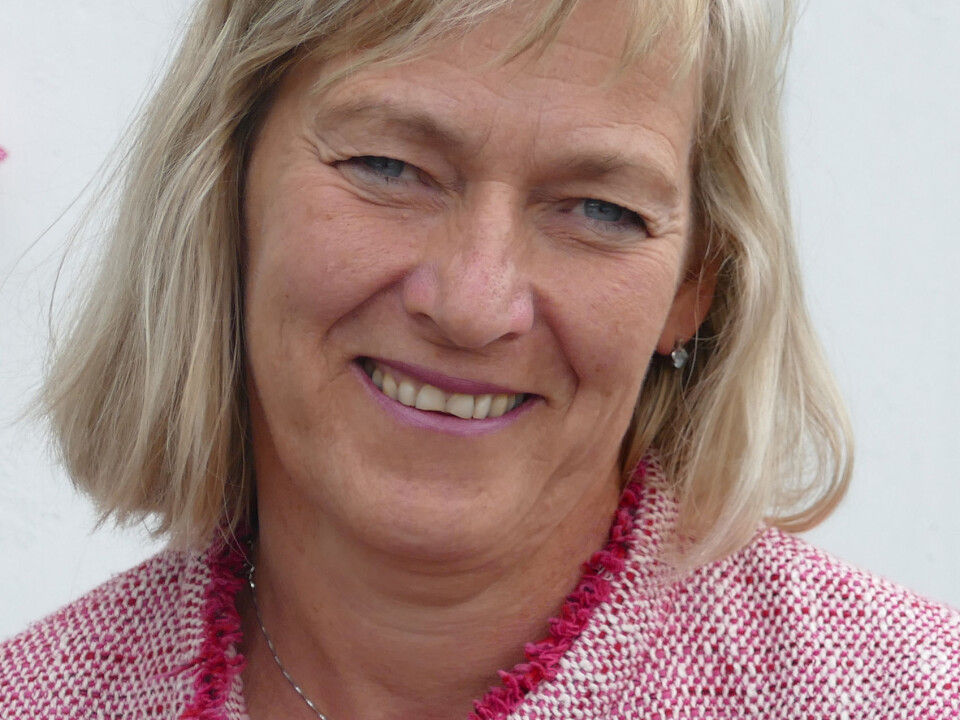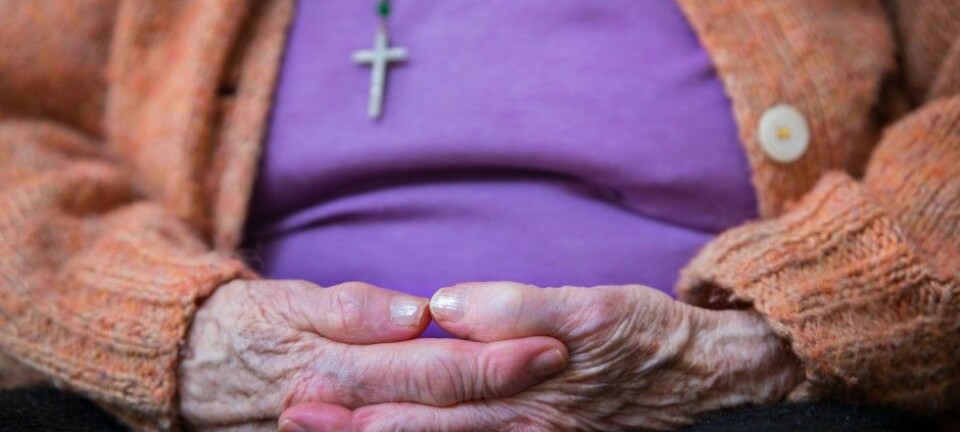
Hallucinations or spiritual experiences?
When is a visit by your deceased uncle a spiritual experience, and when it is a mental illness? It’s not always obvious, one psychiatrist says.
Religious revelations and psychotic hallucinations are sometimes confusingly similar.
“The two can resemble each other. It’s difficult to separate out what contributes to the disease,” says psychiatrist Hilde Hanevik, who works at Jæren District Psychiatric Centre in southern Norway. She has just finished her doctorate, for which she interviewed 29 patients with psychotic disorders.
People with psychotic issues may see visions or hear voices. They experience hallucinations as so real that they are unable to distinguish between fantasy and reality.
It’s not uncommon for these experiences to have spiritual content. They can range from visits by the dead to contact with higher powers. Or the patient may believe that he is Jesus and omnipotent.

The participants in the study have different types of psychoses, including schizophrenia and depression. They must meet a number of criteria to receive these diagnoses, but hallucinations are a symptom of several illnesses.
Crop circles and reincarnation
Holy wars, crop circles, reincarnation, good and evil forces, meetings with ancestors and a personal relationship with a holy figure are just some of the incidents that patients report.
Many people without a mental disorder claim to have similar experiences. Some see the Virgin Mary, others find angel feathers in their couch.
Occurrences like these extend beyond religious ranks. A 1991 survey shows that twelve per cent of the Norwegian population report having contact with dead people. American and British studies suggest that up to half of grieving individuals experience contact with the deceased.
- RELATED: Normal to feel presence of the dead
Hanevik refers to an American study that compared the beliefs of charismatic churches and psychosis patients and concluded that the content of their thoughts was about equally unusual.
One of the things that separate the two groups is how preoccupied psychosis patients become with those thoughts.
“The thoughts take over their world,” Hanevik says.
Whereas believers usually share their experiences with others, the psychotic patient remains isolated,” she says.
“The problem with psychosis is that no one else identifies with the perception of reality you have. The sense experiences lead a psychotic person to create their own very private world,” she adds.
Uncomfortable exploration
But Hanevik believes that psychotic patients must be allowed to have a spiritual life, too.
She wants the health care system to dare to explore the distinction between faith and illness, and admits that “we may have been a little uncomfortable with this”.
She is the daughter of a priest and attends church, and is open to the idea that spiritual experiences can be real.
But since it’s impossible to ascertain whether God exists or whether relatives can continue to make visitations after they’ve died, the psychiatrist is trying another approach.
Hanevik is more interested in what function the experiences have for patients.
Can faith help them through difficult times or does it contribute to them becoming even sicker?
Like healthy believers, several of the patients in the study say that the events are important to them.
“Feeling God’s presence, or the presence of whatever you feel is sacred, can give you meaning, support and confidence in life,” she says.
This is the experience of Betty, a participant in the study. She feels that she finally gets to rest in the arms of God after being plagued by depression and hallucinations and lying in bed sleepless.
- RELATED: Churchgoers have lower blood pressure. So is it healthy to believe in God? Read on in this article written and produced by the Norwegian University of Science and Technology, NTNU Religious beliefs battle hypertension
Thinks he's Jesus
Not everyone in the study was religious to begin with. But it can be comforting for patients to put their hallucinations into a religious framework. It can also help them understand their mystical, confusing and sometimes frightening experiences. God can be a companion through a difficult illness.
The psychosis itself also appropriates religious elements.
Elmer believes he is closer to God than most people. He believes he is God's son, although he has never had a Bible, and doesn’t know what Jesus did.
"I can’t walk around and think that I’m Jesus without getting signs,” he says and tells about one of them:
"It began to burn something fierce. I took my hand and put it on top [of the fire] and it hurt like heck, you know, but I just kept it there until all the flames died down and then I looked at my hand afterwards – no burn marks! Try to explain that! It’s impossible to explain. "
Experiences like those Elmer describes can be both good and bad for patients, says Hanevik.
Elmer feels they’ve saved him. "If I hadn’t had this belief (of being Jesus), I would have killed myself," he says.
Believing that he has supernatural abilities can give Elmer a sense of control in his life. Maybe he likes the ideas of being a powerful, important person for the very reason that as a human being he feels the opposite, that he has no power or value.
“At the same time, that notion becomes an escape from reality and isolates him even more from other people,” says Hanevik.
Dangerous convictions

Several of the patients that Hanevik interviewed use faith to cope with their psychosis.
But belief in higher powers can also be dangerous for them. Voices and visions do not always have good intentions. Evil spirits can bring messages for a patient to harm himself or others.
This happened to Hans. "I can see that I’ve been drawn to dark forces... I believe so strongly that there are outside forces, and I’ve heard voices, good and evil ones, and I’ve seen some kinds of shapes. There’s a lot that’s so intense... ," he says.
Danny believes that Jesus is an astronaut who will pick him up if he tries to commit suicide by jumping from a bridge.
And although Elmer thinks it’s a lifesaver to be Jesus, Hanevik sees that it doesn’t help him integrate back into society.
She has treated psychotic patients over several years and found this to be an advantage when she was interviewing patients. It can be tricky business to follow the logic of a twisted view of reality.
Can get even sicker
One-third of schizophrenia patients will never be cured of the illness, which is one of the psychoses Hanevik has studied.
Some psychiatrists believe that focusing on the content of the psychosis can make patients sicker. Hanevik belongs to a tradition that believes exploring experiences can help patients sort out the ideas whirling in their heads.
Some studies show that patients with religious delusions are sicker than other psychotic patients. They may find it difficult to accept that they’re sick, because they’re convinced that their experiences are religious.
Yet Hanevik thinks it’s wrong to categorize all visions and voices as evidence of delusions,. Some experiences can be part of a healthy faith life.
Conversely, patients who do consider themselves religious don’t necessarily interpret their hallucinations as religious experiences.
If they do, they may run into problems with their faith. When vexing hallucinations are related to God, religion can turn into something negative. Then God is not longer a safe haven.
Ingrid had a good relationship with God before she began to feel that he was after her. The voice she heard and believed was God’s, changed from caring to uncomfortable and judgmental.
“This led to her losing her faith,” says Hanevik. She believes that religion can also affect people negatively. “But I don’t think any religion has a God who wants believers to make fools of themselves.
Tradition or illness?
Some of the patients that Hanevik talked to are afraid to talk about their faith because they fear that it will always be seen in light of their illness.
Social anthropologist Mona Kiil interviewed patients for her doctoral thesis who have mental disorders but are not psychotic. These individuals share the same concerns.
They believe in healing through rituals and that they can see the dead. And they’re afraid that psychologists will classify these experiences as signs of psychosis,” explains Kiil.
- Read more about Kiils work in this article: Patients with mental problems hide their visits to the traditional healer
She thinks it’s all about what society regards as inside and outside of social boundaries.
“When you live in a community where this is part of the worldview, faith provides security for people. That isn’t psychosis. But faith can become a double-edged sword if it prevents them from participating in society,” says Kiil, who is doing her doctoral work at UiT - The Arctic University of Norway.
She encourages health care clinicians in to explore patients’ cultural backgrounds, to go into their stories and not categorize something as sick simply because they’ve never heard of it before.
But patients can also use religion as a drug, says Kiil. It's not necessarily healthy to numb the pain instead of dealing with the problems.
“People have a need to cling to something when things get difficult,” she says.
Hanevik agrees, but thinks that religion becomes more of a way to explain their experiences for patients with psychosis.
Normal religiosity
Kiil and Hanevik agree, however, that it is particularly difficult to separate religion from illness when the patient has a psychosis.
UiT ethnography professor Jens Ivar Nergård researched how young psychotic patients in Sweden built up their alternative reality understanding.
He found that a narrow interpretation of what is real in psychiatry poses a challenge for patients. Then they find support in understanding themselves in a religious space. But if you are psychotic and think you’re Jesus, you lose the possibility to be human. You take on religion to throw yourself out of the world.
Nergård thinks Hanevik offers an exciting contribution to the discussion of what can be considered normal religiosity and believes that healthcare professionals should think through questions like this.
“The boundaries between psychosis and religion may not be something they think about everyday,” he says.
———————————————————
Read the Norwegian version of this article at forskning.no
Reference:

































